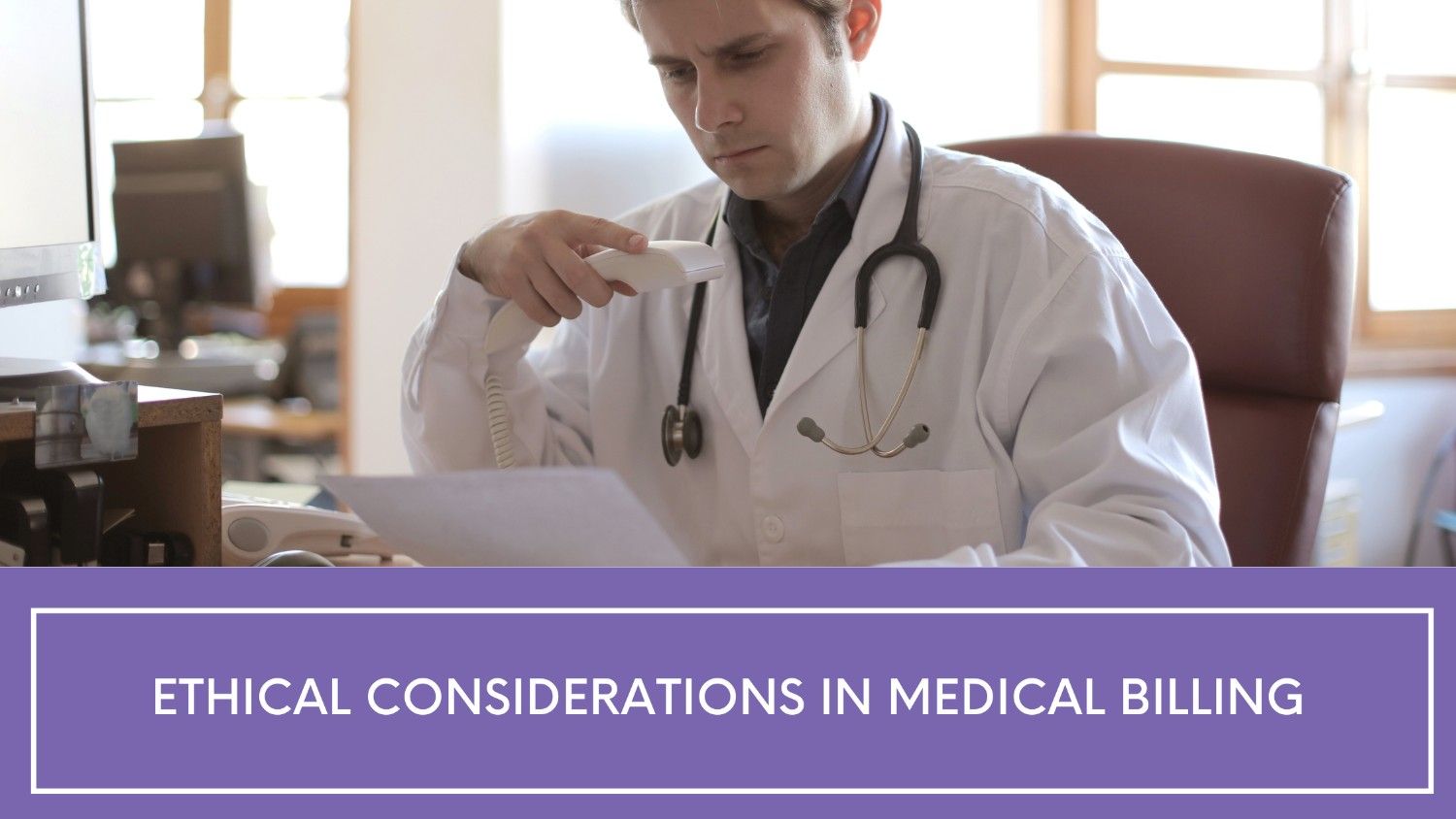Ethical Considerations in Medical Billing
Ethical medical billing practices is the backbone of healthcare financial operations, translating medical procedures into a language understood by insurance companies to secure payment for services rendered. This process, while essential for the financial health of medical practices, hospitals, and healthcare systems, is fraught with ethical challenges. These challenges arise from the need to balance financial viability and profit with the fundamental duty to provide patient care. Ethical considerations in medical billing encompass issues such as transparency, fairness, and the integrity of both the billing practices and the broader healthcare delivery system.
Table of Contents
The Foundations of Ethical Medical Billing
Medical billing ethics can be distilled into several core principles, including honesty, transparency, and fairness. These principles are integral to ensuring that the financial aspects of healthcare do not undermine patient trust and the quality of care.
- Honesty: Accurate representation of services rendered is crucial. Over coding, under coding, and unbundling services to maximize reimbursement are forms of dishonesty that violate ethical standards and legal requirements.
- Transparency: Patients have a right to understand their medical bills. Transparent billing practices help demystify the often complex and opaque billing process, fostering trust between patients and healthcare providers.
- Fairness: Fair billing practices ensure that patients are not overcharged and that there is no discrimination in billing based on a patient’s insurance status or ability to pay.
The Role of Regulations and Standards
Several regulations and standards guide ethical medical billing practices. These include:
- The Health Insurance Portability and Accountability Act (HIPAA): HIPAA ensures the protection of patient information, which extends to billing practices. Billing professionals must ensure that patient data is handled securely and confidentially.
- The False Claims Act (FCA): The FCA aims to prevent fraud in billing. Under this act, submitting false claims to insurance companies, including Medicare and Medicaid, is illegal.
- The American Medical Association (AMA) Code of Medical Ethics: The AMA provides guidelines on ethical billing practices, emphasizing honesty and transparency.
Common Ethical Challenges in Medical Billing
Despite these regulations and guidelines, medical billing is rife with ethical challenges. These challenges can arise from various sources, including systemic issues, individual behaviour’s, and the inherent complexities of the healthcare system.
Upcoding and Overbilling
Upcoding refers to the practice of using billing codes that reflect more severe conditions or more expensive procedures than those actually provided. This practice, while increasing revenue for healthcare providers, is unethical and illegal. Overbilling, a related issue, involves charging patients or insurers more than the agreed-upon rates or billing for services not provided.
Case Study: A large healthcare system was found to be systematically upcoding patient visits to higher levels of care to increase reimbursement rates. This not only violated legal standards but also eroded patient trust when the practice was exposed. The healthcare RCM system faced significant fines and had to implement extensive compliance training to rectify the situation.
Under coding and Underbilling
Conversely, under coding occurs when healthcare providers use codes that reflect less severe conditions or less expensive procedures than those provided. This practice can be driven by a desire to avoid audits or scrutiny from health insurance companies. However, it can lead to inadequate compensation for services rendered and potential underfunding of healthcare practices.
Case Study: A small clinic consistently undercoded services to avoid potential disputes with insurance companies. While this practice initially seemed to protect the clinic from audits, it ultimately resulted in financial strain and an inability to invest in new medical technologies and staff training, adversely affecting patient care.
Unbundling and Fragmentation of Services
Unbundling involves billing for individual components of a procedure separately rather than using a single comprehensive code. This practice can lead to higher overall costs for patients and insurers and is considered fraudulent.
Case Study: An outpatient surgery center was found to be unbundling services to maximize reimbursement. Patients receiving routine procedures were billed for each step separately, leading to exorbitant bills. When this practice was uncovered, the center faced legal action and reputational damage, highlighting the need for ethical billing practices.
Patient Overcharging and Price Transparency
Patients often receive bills with charges that are not clearly explained or justified. The lack of price transparency can result in patients being overcharged for services, leading to financial distress and mistrust in the healthcare system.
Case Study: A hospital implemented a new pricing strategy that was not clearly communicated to patients. As a result, many patients received unexpectedly high bills, causing outrage and complaints. The hospital had to review and revise its billing practices and improve communication with patients to restore trust.
Insurance Denials and Appeals
Dealing with insurance denials is a common aspect of medical billing. Ethical considerations come into play when deciding how to handle these denials. Patients may be unfairly burdened with the responsibility of navigating complex appeals processes.
Case Study: A billing department faced a high volume of insurance denials for a particular treatment. Instead of assisting patients with the appeals process, the department passed the responsibility onto the patients. This approach led to significant stress and financial hardship for patients, underscoring the need for billing professionals to advocate for their patients and assist with insurance issues.
Balancing Profit and Patient Care
Healthcare providers operate in a competitive and financially demanding environment. Balancing the need for profitability with the ethical obligation to provide quality patient care is a constant challenge. Here are some strategies to achieve this balance:
Implementing Ethical Training Programs
Healthcare organizations should invest in comprehensive training programs that emphasize ethical billing practices. These programs should cover legal requirements, the importance of transparency, and the consequences of unethical behavior.
Case Study: A large healthcare network implemented an extensive training program focused on ethical billing. The program included real-life scenarios, role-playing exercises, and regular assessments. As a result, the network saw a significant reduction in billing errors and a marked improvement in patient satisfaction and trust.
Developing Clear Policies and Procedures
Clear policies and procedures help ensure consistency and fairness in billing practices. These policies should be regularly reviewed and updated to reflect changes in regulations and industry standards.
Case Study: A medium-sized hospital developed a comprehensive billing policy manual. The manual included guidelines for coding, handling insurance denials, and communicating with patients. By adhering to these policies, the hospital reduced billing discrepancies and improved its financial stability.
Leveraging Technology for Ethical Billing
Advancements in technology, particularly AI and machine learning, can support ethical billing practices. These technologies can help detect anomalies, prevent fraudulent activities, and ensure compliance with regulations.
Case Study: A healthcare startup incorporated AI-driven billing software to enhance accuracy and detect potential fraud. The software flagged suspicious billing patterns and provided suggestions for ethical coding. This proactive approach not only improved compliance but also optimized revenue cycles.
Promoting a Culture of Ethics and Accountability
Creating a culture that prioritizes ethics and accountability is crucial. This culture should be reinforced by leadership and embedded in every aspect of the organization’s operations.
Case Study: A community health center emphasized a culture of ethics through regular staff meetings, open discussions about ethical dilemmas, and recognition of employees who demonstrated ethical behavior. This approach fostered a sense of accountability and integrity among the staff, leading to more ethical billing practices.
Patient Education and Engagement
Educating patients about their bills and involving them in the billing process can enhance transparency and trust. Providing clear explanations of charges and assisting with insurance issues are important steps in this direction.
Case Study: A large medical practice launched a patient education initiative that included detailed billing statements, educational brochures, and a dedicated helpline for billing questions. This initiative empowered patients to understand their bills better and facilitated smoother interactions between the billing department and patients.
The Future of Ethical Medical Billing
The landscape of medical billing is continually evolving, influenced by changes in regulations, technology, and patient expectations. Looking ahead, several trends and developments are likely to shape the future of ethical medical billing:
Increased Regulatory Scrutiny
Regulatory bodies are expected to intensify their scrutiny of billing practices to prevent fraud and abuse. Healthcare organizations must stay abreast of regulatory changes and ensure compliance to avoid penalties and maintain their reputation.
Advancements in AI and Machine Learning
AI and machine learning technologies will play an increasingly important role in ethical billing. These technologies can automate routine tasks, detect fraudulent activities, and enhance the accuracy of billing processes.
Patient-Centric Billing Practices
There is a growing emphasis on patient-centric billing practices that prioritize transparency, fairness, and patient engagement. Healthcare providers will need to adapt to these expectations by providing clear and understandable billing information and support.
Collaboration Between Billing and Clinical Teams
Closer collaboration between billing and clinical teams can help ensure that billing practices accurately reflect the care provided. This collaboration can also enhance the overall patient experience by reducing billing errors and improving communication.
Ethical Leadership and Governance
Strong ethical leadership and governance are essential for fostering a culture of integrity and accountability. Healthcare organizations will need to invest in ethical leadership development and establish governance structures that support ethical decision-making.
In short, Balancing profit and patient care in medical billing is a complex and ongoing challenge. Ethical considerations are paramount to maintaining patient trust, ensuring compliance with regulations, and achieving financial stability. By prioritizing honesty, transparency, and fairness, healthcare organizations can navigate the ethical complexities of medical billing and build a sustainable and patient-cantered healthcare system.
Investing in ethical training programs, developing clear policies, leveraging technology, promoting a culture of ethics, and engaging patients are key strategies to achieve this balance. As the healthcare landscape continues to evolve, staying committed to ethical principles will be essential for the success and integrity of medical billing practices. In this context, Practolytics play a crucial role in providing trustworthy and efficient medical billing solutions that uphold the highest ethical standards.
DOWNLOAD FREE E-BROCHURE – Role of Preauthorization in Medical Billing Services
Talk to Medical Billing Expert Today — Get a Free Demo Now!






